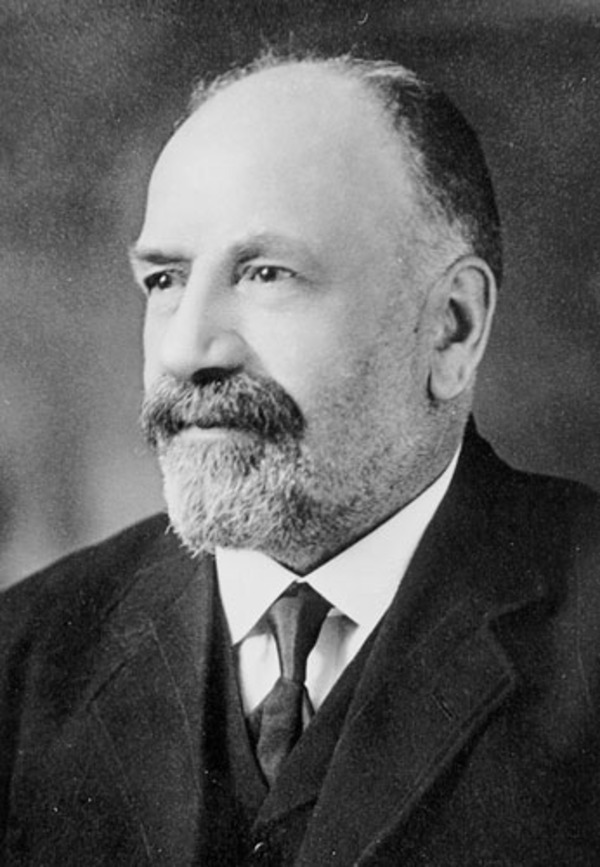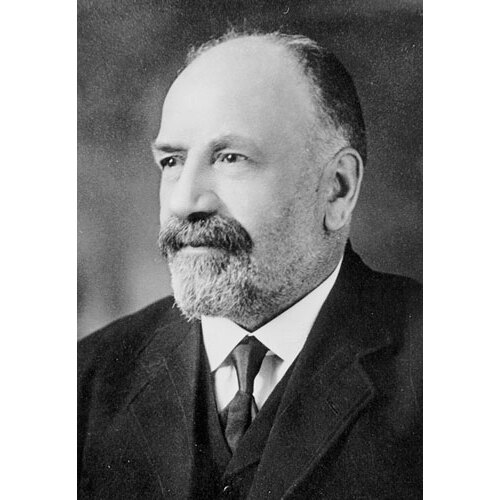
Source: Link
LANGLEY, GEORGE, farmer and politician; b. 10 Nov. 1852 in Saffron Walden, England, son of James Langley and Mary Ann Barker; m. 8 Jan. 1876 Ellen Hales in Stoke Newington (London), England, and they had four sons and a daughter; d. 26 Aug. 1933 near Maymont, Sask.
George Langley was educated in Saffron Walden; at age 23 he married. Leaving rural life, he worked in London on the docks and in business. A political radical, labourite, and soapbox speaker, he was one of the first members of the socialist Fabian Society. Early in 1893 the family bravely came to Canada’s North-West Territories to seek their fortune in farming. Langley was a raw homesteader and “no expert in ox driving,” his son John Victor recalled; the first winter was “a tough one,” but they persevered. After settling north of Saskatoon, first near Osler and then at Rosthern, they moved to the Maymont area. About 1896 Langley was recruited as a campaign assistant by the region’s Liberal mp, Thomas Osborne Davis. It was apparently through Davis that Langley secured work as a sub-land agent in 1903 at the colony established by Isaac Montgomery Barr. By then Langley had embraced organized agricultural interests, starting about 1902 in the Rosthern local of the Territorial Grain Growers’ Association and continuing from 1906 in the influential Saskatchewan Grain Growers’ Association.
Thomas Walter Scott, Saskatchewan’s first premier, was known for his ability to tap into the agricultural sector and thus keep his finger on the pulse of the region. He attracted two key members of the SGGA to politics: Langley and William Richard Motherwell*, a farmer from the Abernethy area. Both ran successfully in the province’s first general election, on 13 Dec. 1905. Langley took his Redberry riding with only a slim margin of 108 votes, but he would be re-elected in 1908, 1912, and 1917 with ever-increasing majorities. By all accounts “this short, stout, bearded Englishman,” as Hopkins Moorhouse described him, was a spellbinder. “He retained a remarkable hold upon the imagination of all those with whom he came into contact,” his son wrote, and “possessed a great sense of humor and a magnetic platform presence.”
Though a backbencher, Langley became an important link between the SGGA and the government. Farmers complained that they could not survive because the large grain-elevator companies, the Canadian Pacific Railway, and the Winnipeg Grain and Produce Exchange were squeezing them out of profitable shipping and sales arrangements [see Henry Oscar Partridge*]. In 1908 Langley was chosen by Scott to negotiate with the Interprovincial Council of Grain Growers over storage facilities in Saskatchewan. The SGGA, of which Langley was a director from 1910 to 1917, favoured a system comparable to that in Manitoba, where the government bought elevators to serve the farmers. Scott, believing that his administration could not afford such a solution, established a royal commission in 1910 to investigate. Consisting of Langley, Robert Magill*, and Frederick William Green*, the SGGA’s secretary-treasurer, it recommended a cooperative company, a course favoured by Scott but not initially by the SGGA members. Langley and Green won them over, and legislation to establish the Saskatchewan Co-operative Elevator Company was passed on 14 March 1911. Langley was elected its first vice-president in July. In 1912 he became a director in another cooperative enterprise, the Grain Growers’ Grain Company Limited.
Scott continued to rely on Langley, whose talents and ties to the agrarian community helped consolidate the Liberals’ hold on government. On 19 Aug. 1912 he was appointed minister of municipal affairs, with additional responsibility for the Bureau of Public Health (formed in 1909). He held the portfolio until 20 Oct. 1921, aided by his daughter, Alice C., who acted as his secretary. Over these nine years he conscientiously dealt with developing issues of taxation and rural and urban administration, limited the civic bonusing of industries (in 1913), reorganized the system for hail-damage insurance, and defended his health commissioner, Dr Maurice Macdonald Seymour. In 1913–14 he participated in another commission, on marketing Canadian grain in Europe, a task that allowed him to visit his homeland.
In cabinet Langley was one of the most outspoken ministers, and a barometer for the party’s criticisms of its leader. One telling situation reached a boil in 1915. Murdoch Archibald MacKinnon, Scott’s Presbyterian pastor in Regina, spoke out against the government’s seeming protection of the Roman Catholic school system in an amendment to the school assessment act. Scott and MacKinnon fought out the issue in the newspapers; in the legislature, on 24 Feb. 1916, the premier rashly referred to MacKinnon as a “moral leper.” Langley intervened. He urged Scott to tone down his rhetoric – the dispute was hurting the party, he counselled.
Following Scott’s resignation in October 1916, Langley stayed on in the cabinet of William Melville Martin*, in charge of municipal affairs. From 13 Dec. 1918 to 15 Feb. 1919 he was also acting minister of agriculture. Defeated in the general election of June 1921, he won the deferred election in Cumberland in August. Later that year Martin forced him out of cabinet for exerting pressure on a provincial magistrate. He resigned from the Legislative Assembly in 1922 and sat out the 1925 election. The shift in his relationship with his party, so evident in 1921, had started after World War I, during a period of poor crops and strained financial conditions. Saskatchewan farmers had become political and, as farmers’ alliances splintered, Langley and other SGGA leaders began distancing themselves from the Liberals on issues in 1919. Langley questioned the government’s adoption of Prohibition, for instance, and by late 1921, through support for lower tariffs and other pronouncements, he was openly consorting with the Progressive Party, the group of agrarian mps led by Thomas Alexander Crerar*.
Langley remained active as a grain-growers’ advocate. He had been a consistent proponent of the Canadian Wheat Board, and he was president of the Saskatchewan Co-operative Elevator Company from 1921. When its elevators were taken over by the Saskatchewan Co-operative Wheat Producers (Saskatchewan Wheat Pool) in 1926, he assisted the liquidator as an inspector. The previous year he had become vice-president of the SGGA, from which office he urged the association to field electoral candidates. He himself ran as an independent Liberal in Redberry in 1929 but was defeated. He left the political scene completely, and died four years later at age 80. He was laid to rest in the Maymont cemetery. As a farmer, mla and minister, director of the SGGA, and grain-elevator commissioner, George Langley had served his province and his party well.
London Metropolitan Arch., St Matthias, Stoke Newington, Reg. of marriages, P94/MTS, item 010. G. L. Barnhart, “Peace, progress and prosperity”: a biography of Saskatchewan’s first premier, T. Walter Scott (Regina, 2000). Lynne Bowen, Muddling through: the remarkable story of the Barr colonists (Vancouver and Toronto, 1992). Canadian annual rev., 1910–26/27. CPG, 1909–18. S. M. Lipset, Agrarian socialism: the Cooperative Commonwealth Federation in Saskatchewan, a study in political sociology (Berkeley, Calif., 1950). Maymont Golden Jubilee Committee, The story of Maymont, 1905-1955 (Maymont, Sask., [1955]). Maymont Library Board, From sod to solar: Fielding, Lilac, Maymont, Ruddell (Maymont, 1980). Hopkins Moorhouse [A. H. J. Moorhouse], Deep furrows, which tells of pioneer trails along which the farmers of western Canada fought their way to great achievements in co-operation (Toronto and Winnipeg, 1918). W. L. Morton, The Progressive Party in Canada (Toronto, 1950). Saskatchewan lives past and present, ed. Brian Mlazgar (3v. to date, Regina, 2004– ), Saskatchewan politicians: lives past and present, ed. Brett Quiring, 2004. L. A. Wood, A history of farmers’ movements in Canada (Toronto, 1924; repr., intro. F. J. K. Griezic, Toronto and Buffalo, N.Y., 1975).
Cite This Article
Gordon Barnhart, “LANGLEY, GEORGE,” in Dictionary of Canadian Biography, vol. 16, University of Toronto/Université Laval, 2003–, accessed January 1, 2026, https://www.biographi.ca/en/bio/langley_george_16E.html.
The citation above shows the format for footnotes and endnotes according to the Chicago manual of style (16th edition). Information to be used in other citation formats:
| Permalink: | https://www.biographi.ca/en/bio/langley_george_16E.html |
| Author of Article: | Gordon Barnhart |
| Title of Article: | LANGLEY, GEORGE |
| Publication Name: | Dictionary of Canadian Biography, vol. 16 |
| Publisher: | University of Toronto/Université Laval |
| Year of publication: | 2014 |
| Year of revision: | 2014 |
| Access Date: | January 1, 2026 |



